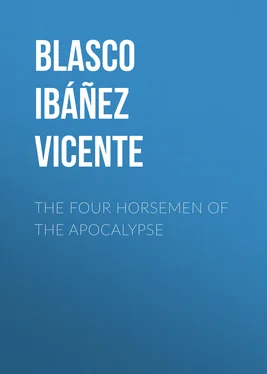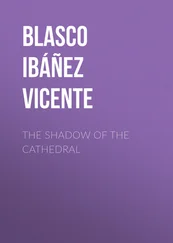Vicente Blasco Ibáñez - The Four Horsemen of the Apocalypse
Здесь есть возможность читать онлайн «Vicente Blasco Ibáñez - The Four Horsemen of the Apocalypse» — ознакомительный отрывок электронной книги совершенно бесплатно, а после прочтения отрывка купить полную версию. В некоторых случаях можно слушать аудио, скачать через торрент в формате fb2 и присутствует краткое содержание. Жанр: foreign_prose, foreign_antique, на английском языке. Описание произведения, (предисловие) а так же отзывы посетителей доступны на портале библиотеки ЛибКат.
- Название:The Four Horsemen of the Apocalypse
- Автор:
- Жанр:
- Год:неизвестен
- ISBN:нет данных
- Рейтинг книги:3 / 5. Голосов: 1
-
Избранное:Добавить в избранное
- Отзывы:
-
Ваша оценка:
- 60
- 1
- 2
- 3
- 4
- 5
The Four Horsemen of the Apocalypse: краткое содержание, описание и аннотация
Предлагаем к чтению аннотацию, описание, краткое содержание или предисловие (зависит от того, что написал сам автор книги «The Four Horsemen of the Apocalypse»). Если вы не нашли необходимую информацию о книге — напишите в комментариях, мы постараемся отыскать её.
The Four Horsemen of the Apocalypse — читать онлайн ознакомительный отрывок
Ниже представлен текст книги, разбитый по страницам. Система сохранения места последней прочитанной страницы, позволяет с удобством читать онлайн бесплатно книгу «The Four Horsemen of the Apocalypse», без необходимости каждый раз заново искать на чём Вы остановились. Поставьте закладку, и сможете в любой момент перейти на страницу, на которой закончили чтение.
Интервал:
Закладка:
Upon Marguerite Laurier the presence of Julio flashed like a ray of sunlight in the tiresome salon of Lacour. She was dancing the fad of the hour and frequenting the tango teas where reigned the adored Desnoyers. And to think that she was being entertained with this celebrated and interesting man that the other women were raving about! . . . In order that he might not take her for a mere middle-class woman like the other guests at the senator’s party, she spoke of her modistes, all from the rue de la Paix, declaring gravely that no woman who had any self-respect could possibly walk through the streets wearing a gown costing less than eight hundred francs, and that the hat of a thousand francs—but a few years ago, an astonishing novelty—was nowadays a very ordinary affair.
This acquaintanceship made the “little Laurier,” as her friends called her notwithstanding her tallness, much sought by the master of the dance, in spite of the looks of wrath and envy hurled at her by the others. What a triumph for the wife of a simple engineer who was used to going everywhere in her mother’s automobile! . . . Julio at first had supposed her like all the others who were languishing in his arms, following the rhythmic complications of the dance, but he soon found that she was very different. Her coquetry after the first confidential words, but increased his admiration. He really had never before been thrown with a woman of her class. Those of his first social period were the habituees of the night restaurants paid for their witchery. Now Glory was tossing into his arms ladies of high position but with an unconfessable past, anxious for novelties although exceedingly mature. This middle class woman who would advance so confidently toward him and then retreat with such capricious outbursts of modesty, was a new type for him.
The tango salons soon began to suffer a great loss. Desnoyers was permitting himself to be seen there with less frequency, handing Glory over to the professionals. Sometimes entire weeks slipped by without the five-to-seven devotees being able to admire his black locks and his tiny patent leathers twinkling under the lights in time with his graceful movements.
Marguerite was also avoiding these places. The meetings of the two were taking place in accordance with what she had read in the love stories of Paris. She was going in search of Julio, fearing to be recognized, tremulous with emotion, selecting her most inconspicuous suit, and covering her face with a close veil—“the veil of adultery,” as her friends called it. They had their trysts in the least-frequented squares of the district, frequently changing the places, like timid birds that at the slightest disturbance fly to perch a little further away. Sometimes they would meet in the Buttes Chaumont, at others they preferred the gardens on the left bank of the Seine, the Luxembourg, and even the distant Parc de Montsouris. She was always in tremors of terror lest her husband might surprise them, although she well knew that the industrious engineer was in his factory a great distance away. Her agitated aspect, her excessive precautions in order to slip by unseen, only served to attract the attention of the passers-by. Although Julio was waxing impatient with the annoyance of this wandering love affair which only amounted to a few fugitive kisses, he finally held his peace, dominated by Marguerite’s pleadings.
She did not wish merely to be one in the procession of his sweethearts; it was necessary to convince herself first that this love was going to last forever. It was her first slip and she wanted it to be the last. Ay, her former spotless reputation! . . . What would people say! . . . The two returned to their adolescent period, loving each other as they had never loved before, with the confident and childish passion of fifteen-year-olds.
Julio had leaped from childhood to libertinism, taking his initiation into life at a single bound. She had desired marriage in order to acquire the respect and liberty of a married woman, but feeling towards her husband only a vague gratitude. “We end where others begin,” she had said to Desnoyers.
Their passion took the form of an intense, reciprocal and vulgar love. They felt a romantic sentimentality in clasping hands or exchanging kisses on a garden bench in the twilight. He was treasuring a ringlet of Marguerite’s—although he doubted its genuineness, with a vague suspicion that it might be one of the latest wisps of fashion. She would cuddle down with her head on his shoulder, as though imploring his protection, although always in the open air. If Julio ever attempted greater intimacy in a carriage, madame would repel him most vigorously. A contradictory duality appeared to inspire her actions. Every morning, on awaking, she would decide to yield, but then when near him, her middle-class respectability, jealous of its reputation, kept her faithful to her mother’s teachings.
One day she agreed to visit his studio with the interest that the haunts of the loved one always inspires. “Promise that you will not take advantage of me.” He readily promised, swearing that everything should be as Marguerite wished. . . . But from that day they were no longer seen in the gardens, nor wandering around persecuted by the winter winds. They preferred the studio, and Argensola had to rearrange his existence, seeking the stove of another artist friend, in order to continue his reading.
This state of things lasted two months. They never knew what secret force suddenly disturbed their tranquility. Perhaps one of her friends, guessing at the truth, had told the husband anonymously. Perhaps it was she herself unconsciously, with her inexpressible happiness, her tardy returns home when dinner was already served, and the sudden aversion which she showed toward the engineer in their hours alone, trying to keep her heart faithful to her lover. To divide her interest between her legal companion and the man she loved was a torment that her simple and vehement enthusiasm could not tolerate.
While she was hurrying one night through the rue de la Pompe, looking at her watch and trembling with impatience at not finding an automobile or even a cab, a man stood in front of her. . . . Etienne Laurier! She always shuddered with fear on recalling that hour. For a moment she believed that he was going to kill her. Serious men, quiet and diffident, are most terrible in their explosions of wrath. Her husband knew everything. With the same patience that he employed in solving his industrial problems, he had been studying her day by day, without her ever suspecting the watchfulness behind that impassive countenance. Then he had followed her in order to complete the evidence of his misfortune.
Конец ознакомительного фрагмента.
Текст предоставлен ООО «ЛитРес».
Прочитайте эту книгу целиком, купив полную легальную версию на ЛитРес.
Безопасно оплатить книгу можно банковской картой Visa, MasterCard, Maestro, со счета мобильного телефона, с платежного терминала, в салоне МТС или Связной, через PayPal, WebMoney, Яндекс.Деньги, QIWI Кошелек, бонусными картами или другим удобным Вам способом.
Интервал:
Закладка:
Похожие книги на «The Four Horsemen of the Apocalypse»
Представляем Вашему вниманию похожие книги на «The Four Horsemen of the Apocalypse» списком для выбора. Мы отобрали схожую по названию и смыслу литературу в надежде предоставить читателям больше вариантов отыскать новые, интересные, ещё непрочитанные произведения.
Обсуждение, отзывы о книге «The Four Horsemen of the Apocalypse» и просто собственные мнения читателей. Оставьте ваши комментарии, напишите, что Вы думаете о произведении, его смысле или главных героях. Укажите что конкретно понравилось, а что нет, и почему Вы так считаете.











